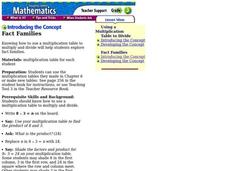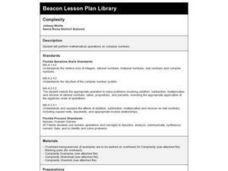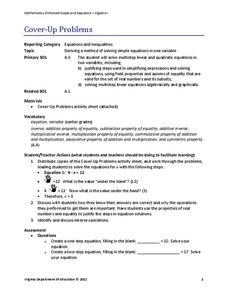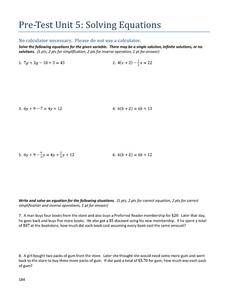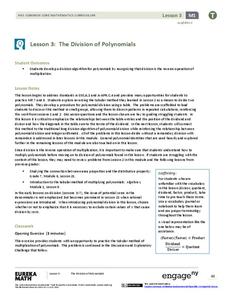BW Walch
Linear & Exponential Functions
Positioned inside the framework of linear and exponential functions, this lesson is more of an investigation into the effects of changing variables and constants inside an expression. The author takes familiar formulas, those for...
Curated OER
Fact Families
Students explore fact families. In this multiplication lesson plan, students use a multiplication table to find the answers to several multiplication equations. Students form fact families from each completed equation.
Curated OER
Teaching About Magnets in Kindergarten
Students explore magnets through the five lessons of this unit. The everyday uses of magnets and an awareness of magnetic attraction form the basis of the skills presented in these lessons.
Curated OER
Mathematical Properties for Addition
In this math worksheet, students read about and learn the properties of addition. Students study the commutative, associative, identity and inverse properties. There are no problems on this page for students to solve.
Curated OER
Complexity
Students perform mathematical operations on complex numbers. After a lecture/demo, students utilize a worksheet imbedded in this plan to gain practice performing operations on complex numbers.
Curated OER
Subtracting Integers
In this mathematics worksheet, 6th graders subtract a number, add its opposite, and explain what opposites are, giving an example of two numbers that are opposites. Then they subtract each integer by adding its opposite.
Pennsylvania Department of Education
Links Away: Looking Back and Moving Forward
Students explore fact families. In this math lesson, students use links to model a fact family. Students solve addition and subtraction problems.
Virginia Department of Education
Cover Up Problems
Don't cover up this resource — use it out in the open! Pupils learn how to cover up various parts of a linear equation in order to help solve the equation. A worksheet of problems provides practice with this skill.
Alabama Learning Exchange
Solving Formulas for the Given Variable
Recycle, reuse, and rearrange! Young scholars learn to rearrange formulas to highlight a variable of interest. They then use their new formulas to make calculations.
Virginia Department of Education
Simplifying Square Roots of Whole Numbers
Simplify your life by using a resource on simplifying square roots. Pupils review square roots and calculate values of given radical expressions using a calculator. The instructional activity concludes by having them consider the results...
West Contra Costa Unified School District
Simplifying Radicals – Day 1
It doesn't get simpler than this. Scholars first learn to simplify radicals by determining the prime factors of the radicand. The lesson progresses to simplifying radicals involving algebraic expressions in the radicand.
Charleston School District
Pre-Test Unit 5: Solving Equations
Your pupils just may know more than you think they do! A pre-test assesses their ability to solve and write equations. It includes simple quadratic and cubic equations as well.
Charleston School District
Solving Exponent Equations
Show your class that not all equations are linear. The lesson asks learners to solve simple quadratic and cubic equations using square and cube roots. Problems include equations with no solutions.
Charleston School District
Solving for a Missing Dimension
If a can has a volume of twelve ounces, how tall it should be? If you can work with volume formulas, it's is an easy measurement to find. After finding the volume of figures in the previous lesson of the series, learners now...
EngageNY
The Division of Polynomials
Build a true understanding of division of polynomials. Learners use their knowledge of multiplying polynomials to create an algorithm to divide polynomials. The area model of multiplication becomes the reverse tabular method of division.
Inside Mathematics
Hexagons
Scholars find a pattern from a geometric sequence and write the formula for extending it. The worksheet includes a table to complete plus four analysis questions. It concludes with instructional implications for the teacher.
Curated OER
Skate Party
Learners use the Frayer model during problem solving. For this problem solving lesson, they examine multiple methods of data collection to solve real world problems. Resources are provided.
Curated OER
Solving Linear Inequalities
Walk the class through the steps of how to evaluate linear inequalities in one variable and graph the solution set. Define and discuss key vocabulary terms, then have individuals work problems of varying difficulty. Included are word...
Inside Mathematics
Party
Thirty at the party won't cost any more than twenty-five. The assessment task provides a scenario for the cost of a party where the initial fee covers a given number of guests. The class determines the cost for specific numbers of guests...
Curated OER
Simple Inequalities
Students solve inequalities. In this inequalities lesson plan, students evaluate simple inequalities. They examine vocabulary words. Students participate in breath holding activities and write inequalities to represent the activity. In...
Curated OER
Systems of Equations and Real Life
What a great classroom resource! The intention of this lesson is to show that real-world math can and should be applied to the community in which your learners reside. The class relates properties of equations to solving for species...
Curated OER
Multiplying and Dividing by 10
Once young mathematicians understand how easy it is to multiply and divide by 10, they'll be hooked! They complete four sections of 12 problems each, all involving this skill. First, scholars find the product of various whole numbers...
DK Publishing
Multiplying and Dividing by 10 and 100
Challenge your third and fourth graders with a math instructional activity about the multiples of 10 and 100! Youngsters solve four sections of problems, all involving multiplying and dividing by 10 and 100. Great practice before getting...
Curated OER
Using Random Sampling to Draw Inferences
Emerging statisticians develop the ability to make inferences from sample data while also working on proportional relationships in general. Here, young learners examine samples for bias, and then use random samples to make...
Other popular searches
- Algebra Inverse Operations
- Matrix Inverse Operations
- Inverse Operations Variables
- Inverse Operations Age 5
- Inverse Operations Symbols



